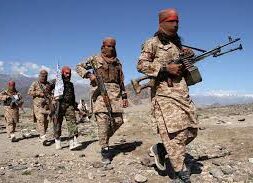
Former Afghan Intelligence Officials Caution India against Trusting Taliban
Manas Dasgupta
NEW DELHI, Dec 2: Some Afghan intelligence officials of the pre-Taliban regime have cautioned India against engaging the current rulers Taliban as friends and letting its guard down in the light of the Pakistan-based terror groups shifting bases to Afghanistan.
“The anti-India sentiments is in Taliban’s blood and India cannot trust them being carried away by their greeting the Indian officials warmly,” they cautioned. “We are not in a position now to advise India, and they know their national interest better, but they should not live in any illusion that the Taliban has changed. Even if they had good meetings and were greeted warmly by [Taliban interior minister Sirajuddin] Haqqani or other Taliban ministers, [they should know] that the anti-Indian sentiment is in [Taliban’s] blood,” They said.
Rahmatullah Nabil, the former Afghan intelligence chief, told a prominent Indian national daily that Pakistani terror groups targeting India like Jaish e Mohammad and Lashkar e Toiba have shifted bases to Afghanistan with help from the Taliban, and have access to more technology and territory.
Mr. Nabil said while engaging the Taliban was necessary for India in its “own interests”, New Delhi should keep channels open with former leaders as well, even though they are now out of power. Mr. Nabil, who served as the Director of the National Directorate of Security (NDS) under both President Karzai and President Ghani, had closely cooperated with India during his tenure (2010-2015), had famously resigned over Mr. Ghani’s visit to Pakistan, and decision to set up hotlines between security chiefs.
He pointed out that thousands of “foreign fighters” were now based in parts of Afghanistan like Kunar and Nuristan provinces, and were in the “preparation phase” of staging attacks on neighbouring countries including India and Tajikistan, adding that they had access to the latest technology, cryptocurrency, and would turn Afghanistan into a “drug and terror hub.”
“So their bases are there, they have got Taliban protection, they have free access, they have weapons left over from US forces. They have access to biometric data,” Mr. Nabil said. “Pakistani [intelligence] doesn’t need give these groups direct support anymore. The Haqqanis are doing the jobs that ISI [Pakistani intelligence] handlers were doing before,” he claimed, referring to the Haqqani group whose leaders are still on the UNSC’s terror list, and were believed to be responsible for attacks on Indian missions in Afghanistan. Pakistan has denied supporting terror groups, and was recently let off the Financial Action Task Force (FATF) grey list for its claimed progress in tackling terror financing.
Mr. Nabil regretted that he was among the former Afghan officials and residents who had been denied visa by India after the Taliban takeover of Kabul in August, 2021.
“For us (officials of the previous regime), we don’t have any complaints against other countries, as we had no expectations, but we have a complaint with our friends. [After August 15 (2021), even those who were friends of India, and those who had diplomatic passports and visas, [were turned away], and visas were revoked,” he said, explaining that he telephoned his former interlocutors in New Delhi to request an entry for him, his mother and family to India after the collapse of the Ghani government but there was no response.
At the time the government had announced that it was cancelling all visas issued due to concerns over security and had announced a special “Emergency e-visa” (Em-X-Misc e-visa) process in its place. However, officials say that of the tens of thousands of applications that were received last year, e-visas have only been issued to less than 300 Afghans, mostly Hindus and Sikhs. Mr. Nabil is among a number of former officials, and ministers who said they were targeted by the Taliban for their links with New Delhi.
“I was in touch [just after Kabul fell]. And when I asked about travel, they simply cancelled my visa. After that, I never tried to contact them, and they didn’t contact me,” he said. No country, including India recognises the Taliban government. However, since its establishment of a regime in Kabul, the Narendra Modi government sent some senior officials of the External Affairs Ministry to hold talks with Taliban leaders and in June this year, set up a “technical mission” in Kabul to help facilitate aid and development assistance for Afghans.













